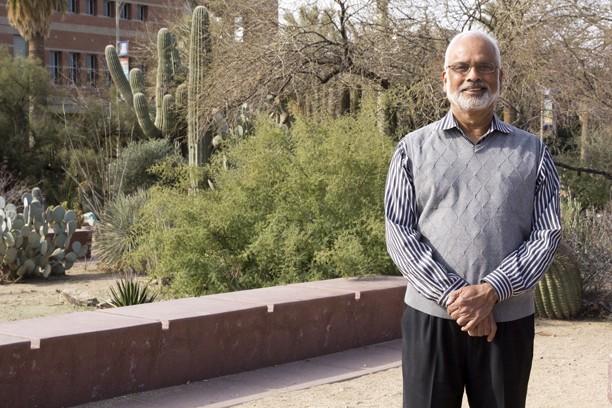Ray Umashankar isn’t in the habit of taking “no” for an answer. After having a total hip replacement surgery nearly 10 years ago, he was told that in the best-case scenario, he’d walk with a cane for the rest of his life.
A little more than a year after the surgery, Umashankar and his wife hiked the Grand Canyon.
In the same vein, Umashankar didn’t let the vastness of the sex trafficking problem in India stop him from helping his daughter tackle the issue.
After 33 years at the UA, Umashankar is retiring this May from his position as the assistant dean of the College of Engineering, with the hope of spending his retirement helping women affected by sex trafficking in India.
As the assistant dean, Umashankar tackles problems with an engineer’s mindset, breaking problems down into smaller pieces and finding solutions from there.
“While I realized the problem was huge, I felt that in my entire lifetime, if I made a difference in the life of one girl, it would still be worth it,” he said.
In 2006, Umashankar helped his daughter and UA alumna Nita Umashankar start the Achieving Sustainable Social Equality through Technology India Foundation. ASSET aims to educate the children of sex workers and provide them with the skills to acquire jobs that will keep them out of the sex trade industry.
After graduating from the UA, Nita Umashankar spent a year in India. While there, she saw how vulnerable women were, especially those neglected, abused or involved in the sex trade.
“Exposure to strong women who’ve been through a lot in India piqued my interest in this,” she said.
When she returned and told her parents about her experience, her father assisted her in starting ASSET.
“He’s been completely instrumental in making this happen,” she continued. “He is the driving force.”
Through the foundation, the two of them network, create partnerships, envision projects and raise awareness.
According to Umashankar, many of the non-government organizations that are working to rescue women from sex trafficking don’t provide adequate services. They teach women how to sew or sell vegetables, which leads to low-paying jobs.
ASSET focuses on teaching women computer skills, since technology-related jobs are in high demand, he said. Through ASSET, they have placed more than 600 women in jobs, and others have gone on to pursue degrees in higher education.
Umashankar is working with the Stanford Global Entrepreneurship Marketing class on a semester-long project to promote ASSET.
According to Richard Esplin, one of the student team leaders in the GEM class, the class aims to teach students how to execute their ideas in a market. His team is working on marketing presentations for ASSET’s Business Process Outsourcing Center project in Forbesganj, Bihar, India, which will be staffed by women from the sex trafficking industry.
Umashankar had to pitch his project and ideas to the class, hoping a team would be interested enough to choose him.
“Fundamentally, it’s about changing the world in a positive way,” Esplin said. “My teammates are all from India, and they know firsthand about the problem that Ray’s trying to solve.”
The use of technology to address the issue is another aspect that interested Esplin in Umashankar’s project. Umashankar has faced many technical challenges in creating ASSET, but he’s already overcome many of them, such as building his own wireless network and investing in innovative energy solutions, according to Esplin.
“I’m just really impressed with a guy who sees a need and doesn’t say that it’s too hard a problem to solve,” Esplin said. “Ray went out and helped solve the problem.”
Umashankar works closely with partner organizations in India and the families of women in the program to discover how best to help. He said he approaches the situation not as someone set in his plans, but as a collaborator.
“If I’m raising funds, I have a moral responsibility that those funds are being spent wisely,” Umashankar said.
Besides working on their BPOC project, Umashankar and his daughter both expressed the importance of raising awareness about the issue.
“It is a huge global problem,” Umashankar said. “A trafficker who used to sell guns said, ‘A gun you can sell only once. A girl you can sell over and over again.’ To me that is absolutely shocking. I shudder when I think of that.”
For Umashankar, the time and effort he’s put into the foundation and helping these women has been completely worth it.
“It’s a tremendous joy to give back,” Umashankar said. “To be able to make a difference in the life of a young person and in your own lifetime see those changes is probably the greatest thing I’ve ever experienced.”









